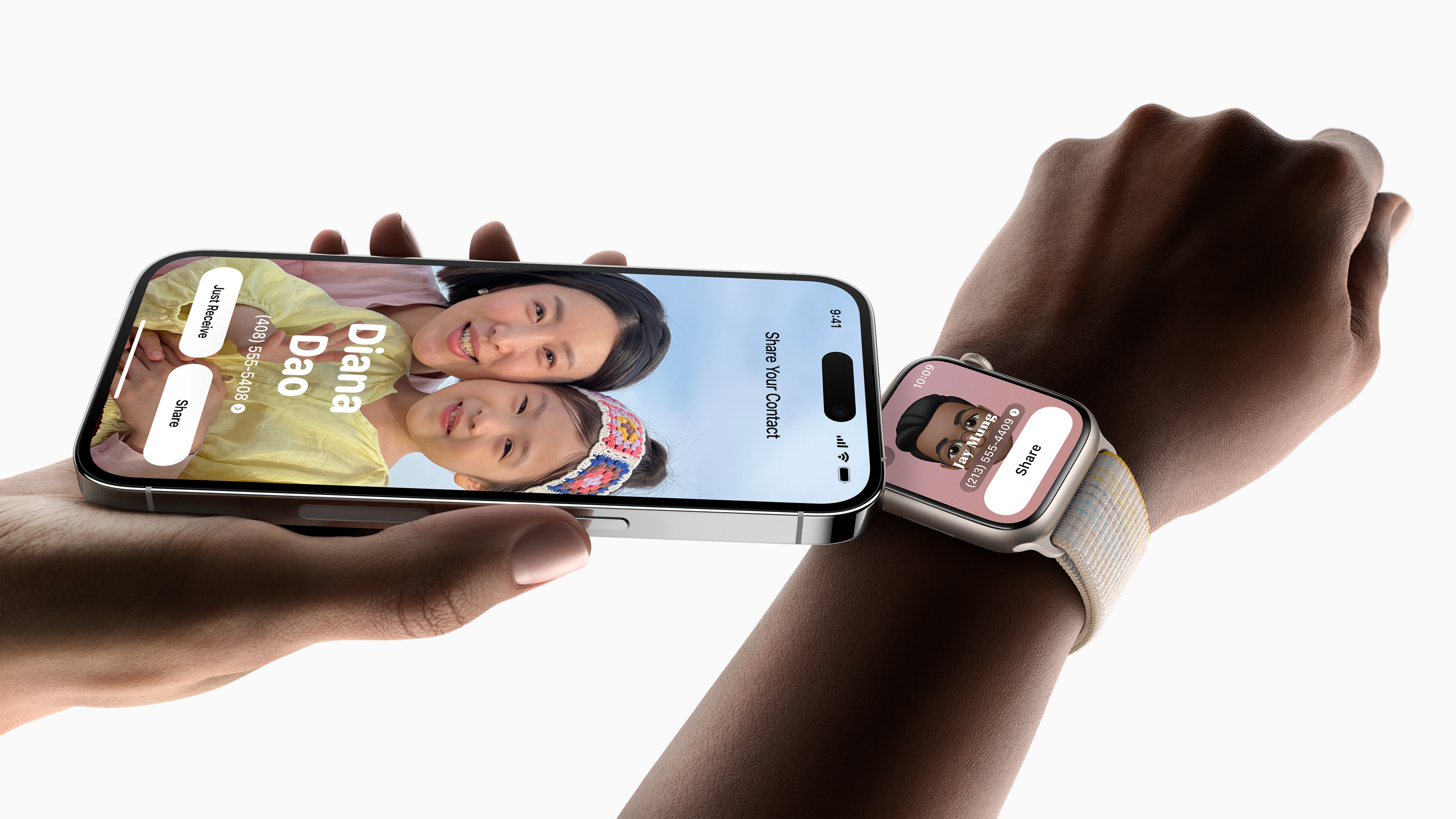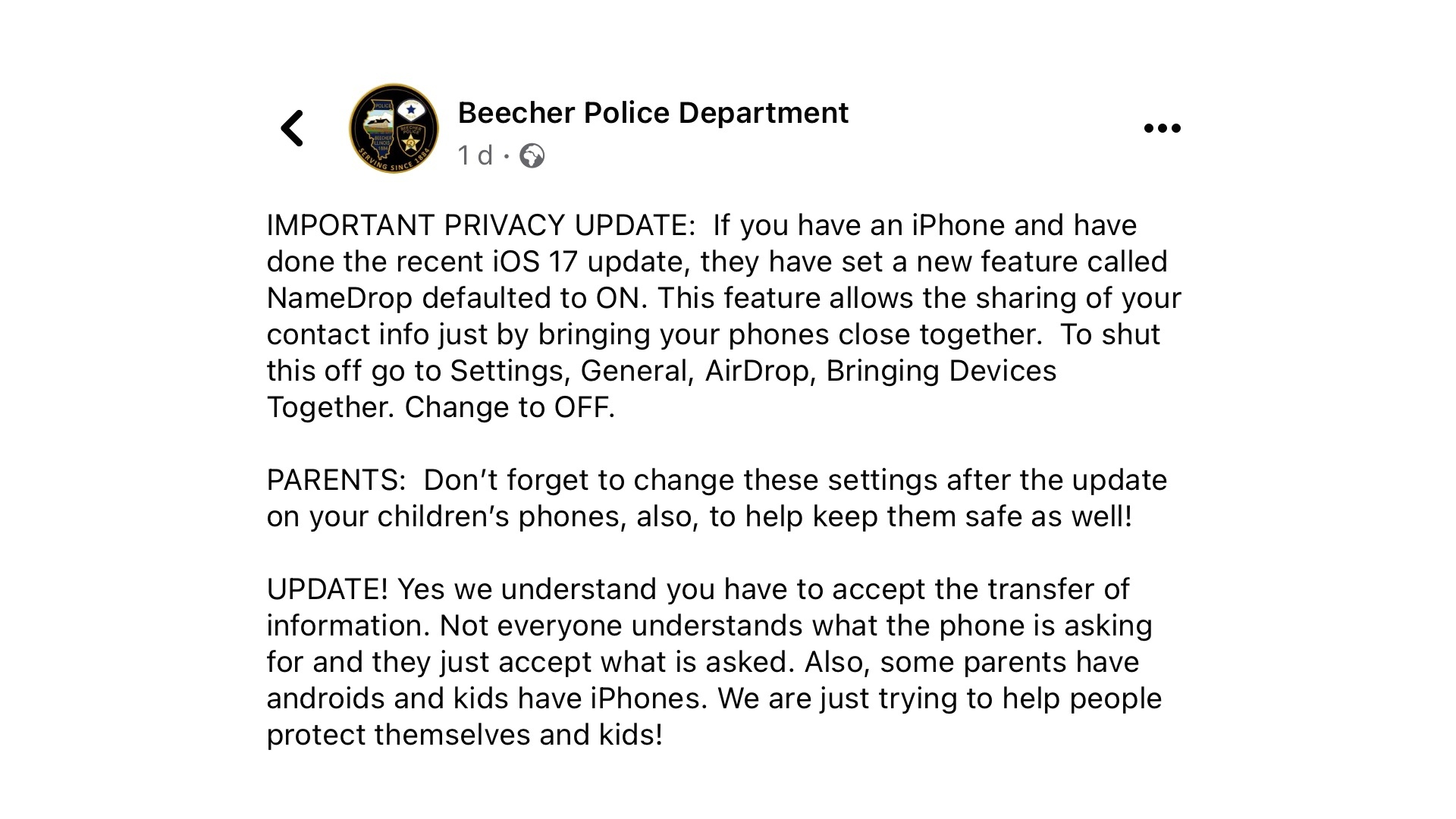No, NameDrop doesn't let people steal your kid's contact info, no matter what Facebook tells you
Because of course it doesn't.

iMore offers spot-on advice and guidance from our team of experts, with decades of Apple device experience to lean on. Learn more with iMore!
You are now subscribed
Your newsletter sign-up was successful
There's a saying (that I just made up) that no good feature goes unpunished. And in the case of the iPhone right now, that feature is NameDrop. You might have noticed viral posts sweeping across Facebook declaring that the new iPhone and Apple Watch contact-sharing feature makes it super-easy for bad people to steal your kids' contact details. And as you've probably already surmised, those posts are completely wrong.
What makes things worse is that these tend to come from a place of authority, often local police departments who no doubt mean well but don't quite grasp how NameDrop works. Because it doesn't work at all like they seem to think it does.
But don't worry, because I'm going to explain how NameDrop does work so that you can share this article the next time someone shares NameDrop FUD in your local school's Facebook group. And yes, I'm writing this because I came across one such post in my son's school's Facebook group this morning.
No. Just, no.
Let's start out with what NameDrop is so that we all have a working knowledge of the feature before we get into what it does and doesn't actually do.
In its most simple form, NameDrop lets you bring your iPhone together with another iPhone or an Apple Watch and quickly share your contact details with someone else. Sounds pretty great, right? It was introduced with iOS 17 and watchOS 10 and it is, indeed, pretty great.
But that's not the way some local police departments and panicked Facebook parents seem to see it.
Opening Facebook this morning I was greeted with an "IMPORTANT PRIVACY UPDATE," emphasis belonging to the Beecher Police Department. This is weird because Beecher seems to be in the United States and I am very much not, but we'll continue.
iMore offers spot-on advice and guidance from our team of experts, with decades of Apple device experience to lean on. Learn more with iMore!

"If you have an iPhone and have done the recent iOS 17 update, they have set a new feature called NameDrop defaulted to ON," the message continues. So far, so good. "This feature allows the sharing of your contact info just by bringing your phones close together." Well, no, that isn't what happens, but let's move on. The post then goes on to explain how to turn NameDrop off, which also disables a ton of other stuff that people might want to use but there's obviously no mention of that.
Then, the Beecher Police Department moves on to instruct parents that they shouldn't "forget to change these settings after the update on your children’s phones, also, to help keep them safe as well!"
Before I explain why that isn't how NameDrop works, let me say that I get it. People want to keep their kids safe. I want to keep my kids safe. But that isn't done by spreading misinformation and panicking parents. But alas, judging by the panic I'm seeing on Facebook, that ship already sailed.
NameDrop for real
The way it's described in this Facebook message, anyone can walk near a kid's iPhone and get their contact details. But that very much isn't how NameDrop works. For starters, the iPhones (or an Apple Watch, no mention of that by the police it seems) need to be almost touching for this to work. Nobody is stealing your kid's phone number by walking past them in the queue for the bus.
Second, as Apple shows in the video below, the sending iPhone has to explicitly tell NameDrop to send the contact details. Nothing happens automatically. Nothing can be done without user intervention, and this whole thing is a non-issue.
Sending our kids to school can be a nerve-wracking thing at the best of times, more so in different parts of the world. There are very real risks and dangers for them and their parents to be aware of. More than enough, in fact. And we certainly don't need to be imagining problems to add to the list of real ones.
So the next time you see someone say on Facebook that NameDrop's a quick and easy way for bad people to steal contact details, send them this. But remember, they're just trying to keep their kids safe — it's the police departments who should know better.

Oliver Haslam has written about Apple and the wider technology business for more than a decade with bylines on How-To Geek, PC Mag, iDownloadBlog, and many more. He has also been published in print for Macworld, including cover stories. At iMore, Oliver is involved in daily news coverage and, not being short of opinions, has been known to 'explain' those thoughts in more detail, too.
Having grown up using PCs and spending far too much money on graphics card and flashy RAM, Oliver switched to the Mac with a G5 iMac and hasn't looked back. Since then he's seen the growth of the smartphone world, backed by iPhone, and new product categories come and go. Current expertise includes iOS, macOS, streaming services, and pretty much anything that has a battery or plugs into a wall. Oliver also covers mobile gaming for iMore, with Apple Arcade a particular focus. He's been gaming since the Atari 2600 days and still struggles to comprehend the fact he can play console quality titles on his pocket computer.
